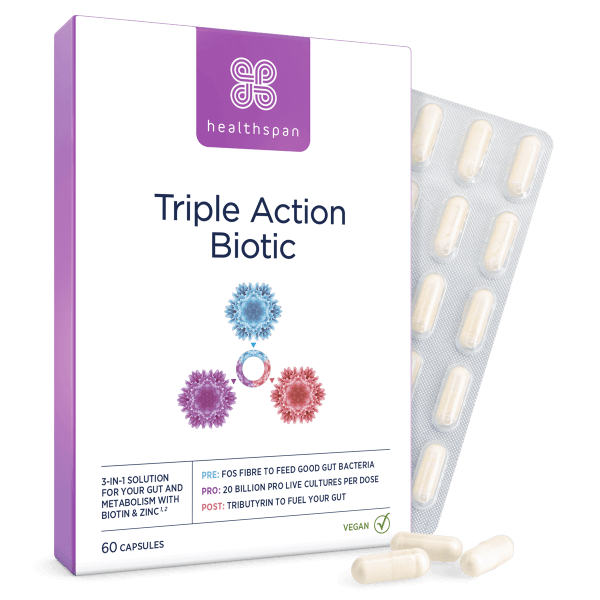The emerging field of postbiotics could help us to better understand and nurture our gut health. Find out what they are and what they can do for you.
🕒 5 min read
Just when we've got our heads around probiotics and prebiotics, along comes the newest kid on the gut health block – the postbiotic.
To understand how postbiotics work, it is helpful to be reminded of what prebiotics and probiotics do to understand the symbiotic relationship between all three.
Prebiotics
These are nutrients that 'feed' the 'friendly' or good bacteria in the gut, helping to produce healthy bacterial growth.
Think of them as a fertiliser or fuel that encourages good bacteria. Prebiotics are mainly dietary fibre that supports digestive health, and are found in foods including garlic, onions, leeks, kale, Jerusalem artichokes, oats, rye, asparagus, chicory root, bananas, flaxseeds, seaweed, and pulses such as chickpeas and lentils, as well as in supplement form.
Research has shown that taking prebiotic supplements reduces levels of the stress hormone cortisol.
Probiotics
These are live gut microbes found in fermented foods such as live or active yogurt, kefir (a fermented milk drink), sourdough, miso (fermented soybeans), sauerkraut and pickles. Alternatively they can be taken in supplement form.
Probiotics are the workers that graft away to help balance the healthy or friendly bacteria in your gut, and have been linked not only to improved digestive health, but also to boosting the immune system, reducing inflammation in the body and improving mood (a large proportion of serotonin – the so-called happy hormone – is produced in the gut.)
Postbiotics
Unlike pre- and probiotics, these are not something you straightforwardly consume in food form, but are helpful chemicals produced in response to what happens when pre- and probiotics combine in the gut.
Often described as the 'waste' or by-products of the fermentation process, they are bioactive compounds (including short-chain fatty acids like butyrate, which provides fuel for the cells of the gut lining, enzymes, peptides, or discarded dead matter from cell walls) made when probiotic bacteria in your gut feed on the various types of prebiotic foods in the colon.
In short: you eat probiotic foods, these ferment in the gut, and postbiotics are produced. These are the end result – your 'reward' – for feeding your gut digestive-friendly prebiotic and probiotic foods.

Probiotic foods, such as yoghurt, kefir and kombucha, contain 'gut-friendly' bacteria, which feed on prebiotic foods, such as bananas, onion and garlic.
The health benefits of postbiotics
Research on postbiotics is still largely in its infancy, and it is still not entirely understood how they operate, but the emerging research suggests that they could offer various health benefits.
Boosting your immune system and protecting against infection
Some types of postbiotics, such as cell wall fragments from healthy bacteria, can increase the production of anti-inflammatory chemical messengers called cytokines, which help reduce inflammation and encourage a healthy immune response.
A 12-week study on 80 healthy older adults given a daily postbiotic supplement lowered their risk of respiratory infections and improved their ability to produce antibodies.
In another interesting study over 20 weeks, 300 older adults were given either a placebo or a low-dose or high-dose postbiotic supplement every day to ascertain whether this could help protect them from the common cold.
The result? Significantly fewer participants in the low and high-dose postbiotic categories went on to catch a cold compared to those in the placebo group.

Triple Action Biotic
3-in-1 gut and digestion support
- Pre, Pro and Postbiotic for gut health
- Chicory root fibre, probiotic bacteria and tributyrin postbiotic
- Added biotin and zinc
Improving digestive symptoms
Research suggests that postbiotics might improve symptoms for people with mild-to-moderate ulcerative colitis or Crohn's disease, which are both types of inflammatory bowel disease (IBD).
Those with IBD tend to produce fewer short-chain fatty acids in their gut; such fatty acids are known to play a role in regulating inflammation in the digestive tract.
One small study, carried out on 13 people with mild-to-moderate Crohn's, found that taking four grams of butyrate (of which tributyrin is a precursor) daily for eight weeks led to a remission of symptoms in over half of participants.
Research also shows that postbiotics could be helpful in both preventing and treating diarrhoea. A clinical trial involving 137 adults with chronic diarrhoea, treated with either a postbiotic supplement or a probiotic one for four weeks, found that the postbiotic more effectively reduced symptoms than the probiotic.
There are other potentially promising health benefits of postbiotics, including treatment or prevention of:
- Leaky gut syndrome. Research has shown that the postbiotic butyrate has potential gut-healing properties, helping to reduce inflammation and restore the intestinal lining to prevent or improve 'leaky gut', or intestinal permeability.
- Eczema. One small study on 34 adults with eczema found that those supplementing with a postbiotic for up to three months reported improvements in the severity of their condition compared to those given a placebo.
- Type 2 diabetes. Research suggests that butyrate-producing bacteria could help better regulate blood sugar levels and may have a role to play in helping to manage type 2 diabetes.
- Heart disease. In studies on animals, butyrate appears to lower blood pressure and potentially inhibit harmful cholesterol production.
However, many of the trials have been very small, or carried out in laboratory studies or on animals, and it's currently unknown whether similar results could be seen in humans.
How to get your postbiotics
Gut bacteria varies over time and from person to person – even in identical twins – and taking a probiotic supplement, for example, might have a beneficial effect on one person's gut bacteria and health, whereas for another a postbiotic might be more helpful.
A diet with a diverse range of fibrous plant-based prebiotic foods, plus live and fermented probiotic ones, should help to encourage postbiotic production. Supplements are also available with pre- pro- and postbiotics in one capsule, giving your gut health a triple-action boost.







